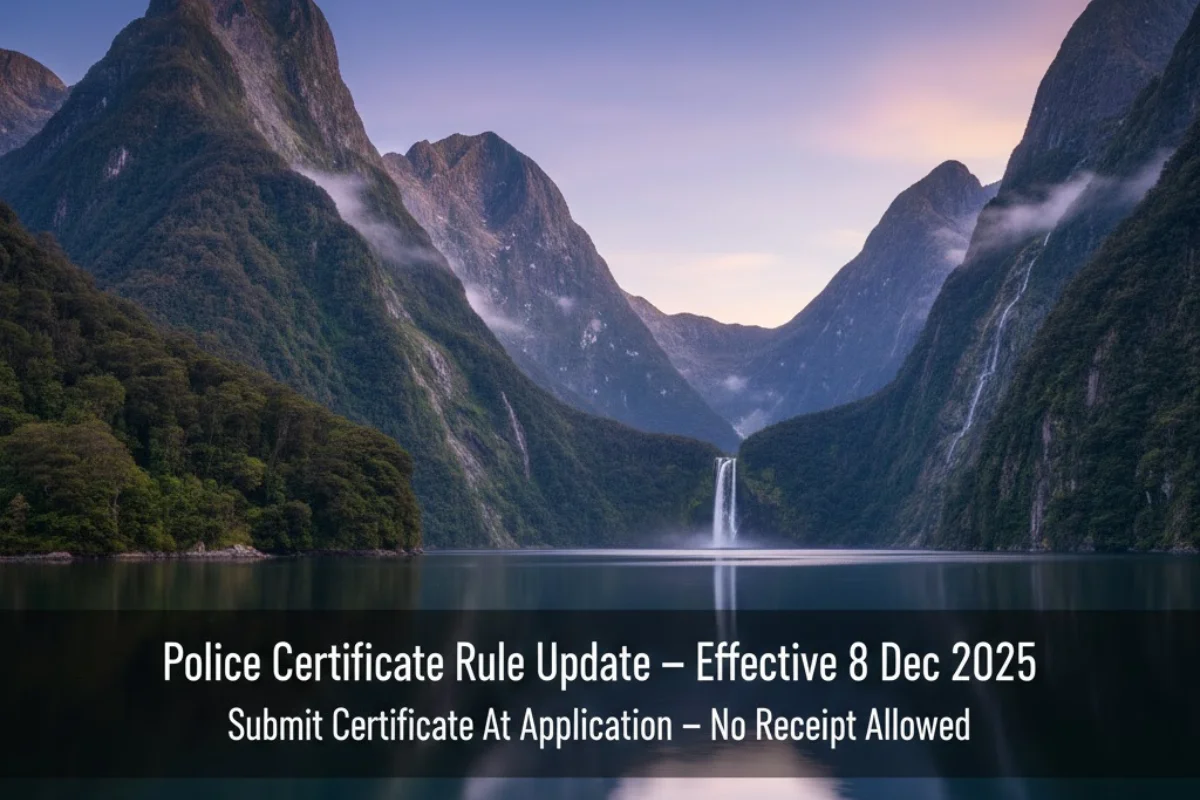
New Zealand Police Certificate Rule from 8 Dec 2025
Table of Contents
From 8 December 2025, New Zealand’s immigration system introduces a clear change: if you apply for an Accredited Employer Work Visa (AEWV), you must upload a valid police certificate rule when you submit your application. In short — no more sending a receipt to show you’ve requested it. This new Police Certificate Rule is important, and if you’re planning to move to New Zealand for work, it matters for timing, planning and peace of mind.
I will explain the Police Certificate Rule in simple English. I will cover what it means, how to get the police certificate, steps for applicants from India, common problems, and practical tips to avoid delays. I will also mention related travel steps like Submit NZeTA Online and where to find NZeTA Visa Information so you have the full picture.
What exactly is the Police Certificate Rule?
The Police Certificate Rule means you must have the actual police certificate ready to upload when you lodge your AEWV application. Before this rule, immigration allowed a receipt showing you had applied for the certificate. Now that receipt is not enough. Immigration New Zealand wants complete documents at the time you send the application. This change aims to make decisions faster and cut down the back-and-forth that slows many applications.
Why the Police Certificate Rule matters
If you apply without the real police certificate, your visa could be delayed, refused, or granted for a shorter time. Immigration officers make decisions based on the papers they have at lodgement. If something important is missing, officers might not be able to accept your case. The Police Certificate Rule removes the “apply and wait” option and asks applicants to be fully ready before they press submit.
How this affects people in India
If you are in India, the Police Certificate Rule means you must start the Police Clearance Certificate (PCC) process early. Many people do not know how long local checks take. In India, a PCC often needs local police verification and can take several weeks. The correct issuing office matters too: for some New Zealand checks, certificates from a Regional Passport Office (RPO) or a specific issuing body are preferred. Make sure you request the certificate from the right office and keep records of when you applied, including any tracking or reference numbers.
How long does a police certificate usually take?
Times vary by place. In several countries, including India, it is common to allow four to eight weeks for the PCC to arrive because local police must check records. Sometimes it is faster, sometimes slower. That is why the Police Certificate Rule asks applicants to plan ahead. If you are on a tight schedule, start the PCC process before you start the rest of your application.
Step-by-step: how to get the police certificate
- Find the right issuing authority for your country. Check official government or embassy pages for the exact office that issues police certificates.
- Apply early and follow instructions carefully. Do not rush the form or miss a supporting document.
- Keep proof of your application. Receipts and tracking help if there is a delay, but remember a receipt will not replace the certificate under the Police Certificate Rule.
- Get certified translations if needed. If your certificate is not in English, arrange a certified translation and include it with the certificate when you upload.
- Keep clear digital copies. Scan or photograph the certificate in high quality and save it as a PDF before you upload.
Common problems and how to fix them
Delays from local police can cause stress. If this happens, contact the issuing office and explain that you need the PCC for a New Zealand visa. Use tracked postal services where possible. If you receive a certificate from the wrong authority, it might not be accepted. The Police Certificate Rule is strict about correct documents, so double-check the issuer. If translation quality is poor, use a certified translator to avoid rejection.
What about NZeTA and travel papers?
The Police Certificate Rule applies to work visas like the AEWV. It does not change visitor entry rules. If you plan a short trip to New Zealand, you may need to Submit NZeTA Online to get permission to travel. For visitor rules and short-term travel, see NZeTA Visa Information. These travel steps are useful, but they are separate from the police check that the Police Certificate Rule requires for work visas.
Practical checklist before you apply (quick and printable)
- Start your PCC (police clearance) application as soon as you plan to move.
- Confirm the correct issuing authority for your country.
- Get translations done early if needed.
- Keep a scanned, high-quality PDF of the certificate ready to upload.
- Only lodge the AEWV once you have the real certificate — the Police Certificate Rule requires it.
Final tips — plan, prepare, and be patient
The Police Certificate Rule is not meant to block people who want to work in New Zealand. It is meant to make applications complete and easier to process. To avoid problems, start the PCC process early, check the correct issuing body, gather translations if needed, and keep digital and printed copies. If you are careful, the Police Certificate Rule will help your application move faster because immigration officers will have everything they need from the start. Follow the Police Certificate Rule carefully. The Police Certificate Rule protects both applicants and the system.